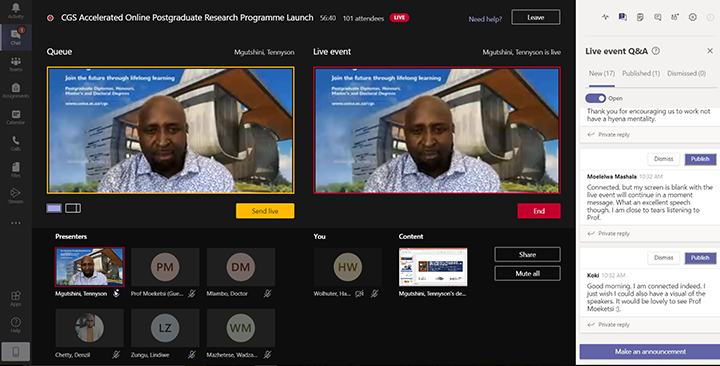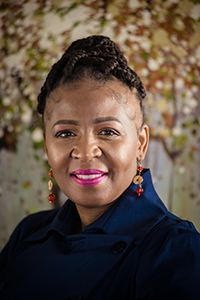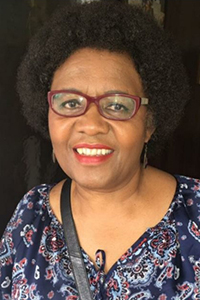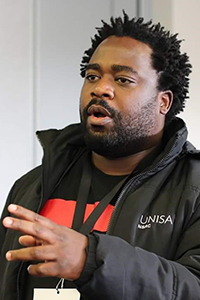News & Events
Comprehensive support ‘anywhere, anytime’ for Unisa’s postgrads
Even in the normal course of events, research can be both a daunting experience and a lonely endeavour if one isn’t in an enabling and supportive environment. Living under the ‘new normal’ of the Covid-19 pandemic era, then, has had the effect of derailing postgraduate students’ prospects of soldiering on, charting a progressive trajectory in their studies and, ultimately, claiming victory.
The College of Graduate Studies (CGS), a central hub for over 25 000 Unisa master’s and doctoral (M&D) students in Africa, launched its Online Accelerated Postgraduate Support Programme in August 2020. This flagship project aims to support all Unisa postgraduate students with research methodology, academic writing and grant writing training courses, thereby helping them as they work towards completing their courses of study and graduating.

Professor Tennyson Mgutshini speaking at the launch event

Professor Lindiwe Zungu
According to Professor Lindiwe Zungu, Project Owner and Executive Dean of CGS, who spoke at the launch, “This research support programme provides a transformed platform, online, relative to the traditional face-to-face support method that we have used in the past. In line with the institutional vision of becoming an African university shaping futures in the service of humanity, the programme talks directly to our strategic focus area of accelerating the mandate of becoming a leading open, distance and e-learning comprehensive university in the service of humanity.”
A resourceful online training package
“Necessity is the mother of all invention,” added Professor Tennyson Mgutshini, the Project Leader. “Unisa’s greatest steps have always been driven by necessity.” Mgutshini also points to the implementation of the programme as yet another reflection of what necessity has driven the institution to do.
Mgutshini said that Covid-19 has necessitated a rethinking of all areas of life specific to education and to open purely online options that can provide a complete experience that is equivalent to what you would have received in a physical class. “This project has allowed the team to offer a totally online training package covering key areas of research,” he said. “In addition, it provides a totally online support framework for students, which implies that student support can be accessed anywhere and at any time during their academic journey.”
The programme, which runs for between four and six months, provides a very distinct package to support students at master’s level in developing their proposals, as well as a similar pathway for doctoral proposal development. The initiative is open to all M&D students registered with Unisa at the proposal level. Similarly, if you are an M&D student at the dissertation or thesis-writing stage, the programme provides comprehensive assistance with each of the chapter-related elements.
“We are interested in giving different levels of support … also for specific needs where, for example, one is struggling to write academic arguments,” affirmed Professor Mgutshini.

Professor Rosemary Moeketsi
Working hard towards breaking new ground
Delivering the keynote address, Professor Rosemary Moeketsi, former Executive Dean of the College of Human Sciences, shared her experiences as both a Unisa student and as a lecturer.
“Studying at Unisa can be lonely; you are all by yourself in your little corner. However, studying at Unisa has its benefits. It is affordable, it teaches you to be self-reliant, to manage your time, to think deeply and independently and to be acutely aware of your circumstances,” she said.
She demystified certain assumptions about the world of research – to wit, that it is something for the learned, the exceptionally intelligent and that it is a very different world. Rather, it is a world in which students can bring their own authentic circumstances to the fore.
“Your research site is exactly where you live or where you work, your research question emanates from your life experience, your research design will be influenced by that environment, your empirical study will be conducted right there. The data collection tools will be determined by that milieu, your research methods will be practical and appropriate. Ethical considerations will come naturally,” Moeketsi added.
She also highlighted the importance of a student’s ability to identify their own field of research, to know exactly what they want to investigate and why they want to do so. She reiterated the fact that students must shy away from misconduct in their research practices and that they must “do the work”, however hard it may be. She motivated students to learn and to acquire knowledge and skills in order that they might be proud of their research project at the end of it all.
“Our country is in dire straits, besieged with every scourge you can think of; crime, violence – especially against children and women – poverty, unemployment, hopelessness, illiteracy and utter helplessness,” Moeketsi said.
She endorsed the idea of students emerging with new solutions and new thinking, unencumbered by colonial stagnation. According to Moeketsi, solutions are available from the young and agile members of our communities to break new ground and lead us into a brighter future.

Wadzani Mazhetese
Innovative intervention for success
The President of the National Students Representative Council, Wadzani Mazhetese, called upon all the student cohort to immerse themselves in this programme, so as to unearth the wealth of knowledge presented and to enhance their collective success.
“By creating a cohort of postgraduate students in research methodology, academic and grant writing, this programme depicts the journey that you are all going to be undertaking, attempting to lay bare the obstacles, yet providing the necessary direction for fully competent research to emerge and contribute to the global discourse,” he said. “This programme tries to tear down difficulties to make sure that the nuances that ought to find expression in every researcher’s work are achieved, allowing all who embark on the journey to succeed as postgraduate students. This programme deliberately impacts on the lives of our people. We know that our university is carrying the biggest mandate in higher education, not only in South Africa but beyond its borders. We are the biggest transformation project in South Africa and Africa, making sure that education is accessible to all the poor, dejected students and other members of the African community.”
Mazhetese encouraged postgraduates to undertake this research journey, to succeed and to be excited about the prospect of being part of the inaugural cohort that will demonstrably prove that it is indeed possible to do just as well as, if not better than everyone else.
Quick links
For more on the programme, check out the video on the CGS YouTube channel: https://www.youtube.com/c/unisacollegeofgraduatestudies/ click on the ‘Introduction to UNISA Accelerated Online Postgraduate Research Programme’
To register for the programme: https://forms.gle/djc9zMqJwYdksSJ49 and for more on the college visit www.unisa.ac.za/cgs
* By Mpho Moloele, PR and Communications Assistant, Department of Research, Innovation and Commercialisation
Publish date: 2020-10-06 00:00:00.0

